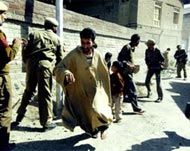Indian premier confident of victory
Indian Prime Minister Atal Behari Vajpayee has said he is confident of victory as he cast his vote in the country’s staggered election.

Exit polls showed his coalition close to a majority in parliament.
Television stations predicted that Vajpayee’s Hindu-nationalist Bharatiya Janata Party and its allies would win between 263 and 282 seats in the 545-seat parliament, after
exit polls from the fourth phase of the five-phase vote.
Wednesday’s voting was concentrated in the northern Hindi heartland or “cow belt”, a BJP stronghold. The final phase of voting is on 10 May, with results expected on 13 May.
The 79-year-old Vajpayee asked for a strong mandate for a new five-year term as he voted in Lucknow, capital of Uttar Pradesh, the nation’s most populous and politically pivotal state.
Asked if his coalition would retain its majority, Vajpayee smiled and said: “Yes. I am confident.”
Voting
Voters from seven states went to the polls on Wednesday, from the disputed mountains of Kashmir and the farmlands of Uttar Pradesh to the sweltering deserts of Rajasthan and the wild tribal regions of remote northeastern states.
Separatist violence erupted in Indian-administered Kashmir, where one person died and 30 were injured in a spate of grenade attacks, but voting elsewhere was largely peaceful.
 |
|
Elections took place amid |
There was voting in just one constituency in Kashmir on Wednesday, and turnout was only 16% in Anantnag after separatists called for a boycott and fighters threw grenades in 10 places, most of them polling booths.
This phase, with 83 seats at issue, was the last real chance for the BJP to cement its position in parliament, and the party and its allies appeared to have won between 47 and 59 seats compared to 40 in 1999, according to exit polls.
It has little presence in the more than 180 seats in next week’s final round, in which it will rely on regional allies.
The opposition Congress and its allies were expected to win anywhere between 167 and 187 seats, well up from 140 in the last election.
The election, staggered over three weeks to allow security forces to move from one place to another, has failed to fire the enthusiasm of many of India‘s 670 million eligible voters.
Turnout reached between 50 and 55% in Wednesday’s round, compared with a national average of 60 percent in 1999.